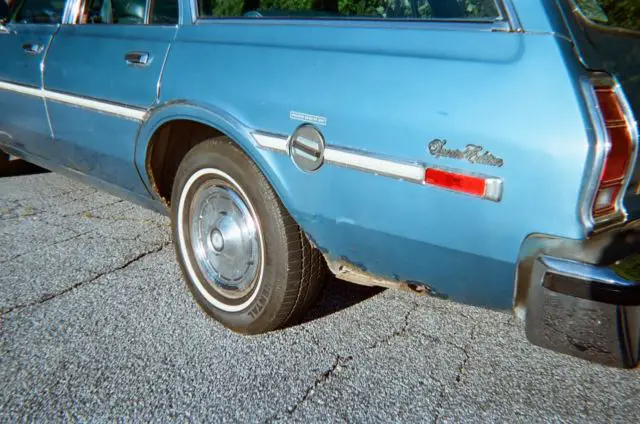The 1976 Dodge Aspen Station Wagon is an exquisite marvel of automotive history, a true reflection of the era’s penchant for utility blended with a distinct flair. When we speak of classic cars, these wagons hold a cherished place in the hearts of enthusiasts who appreciate their nostalgic charm and functional design. The Aspen, in particular, emerges as a quintessential representation of 1970s America, showcasing both the aesthetic and mechanical ideals of its time.
The Era of the Classic Wagons
To fully appreciate the 1976 Dodge Aspen Station Wagon, it is imperative to understand the broader context of classic wagons during the 1970s. This was a decade marked by a notable cultural shift—families began to prioritize comfort and spaciousness in their vehicles, paving the way for the family wagon to ascend in popularity. The station wagon transitioned from mere transportation into a symbol of lifestyle, encapsulating freedom, adventure, and the quintessential family road trip.
Iconic Design and Features
One cannot overlook the Aspen’s design, which harmoniously melds function with a retro aesthetic. The elongated silhouette and tapered rear create a distinct profile, characterized by a chrome-accented grille and curvy lines that evoke a sense of nostalgia. The wood paneling options add a touch of rustic charm, reminiscent of a simpler time when families would pack up for vacations in search of adventure.
Step inside, and the interior embodies a mélange of comfort and practicality. With ample seating for up to six passengers and a vast cargo space, the Aspen is designed for the modern family. Its plush upholstery and vintage dashboard provide a cozy atmosphere that makes every drive feel like a journey through time. Moreover, the integration of features like air conditioning—an emerging luxury at the time—enhances the driving experience significantly.
Engine and Performance
Dodge offered a range of engine options for the Aspen, the most notable being the 5.2-liter V8. This powerhouse not only delivers satisfying performance but also embodies the hearty and robust engineering standards of the time. Under the hood, it provides enough torque to navigate both highways and winding backroads. The vehicle’s suspension system, designed for comfort, ensures a smooth ride, allowing for pleasant journeys whether on city streets or rural landscapes.
The performance of the Aspen also reflects an era where fuel efficiency was redefined. While some may consider the 1976 model a bit thirsty compared to modern standards, it still offers a balanced performance that remains nostalgic for those who remember the heyday of muscle and practicality.
A Community of Enthusiasts
The fascination surrounding the 1976 Dodge Aspen Station Wagon transcends mere ownership; it has fostered a vibrant community of enthusiasts dedicated to preserving this classic. Online forums, car shows, and vintage automobile clubs have sprouted, providing a space for fans to share stories, restoration tips, and the unique experiences associated with these wagons.
Many owners go to great lengths to maintain the authenticity of their Aspens. From sourcing original parts to refurbishing interiors, these aficionados take pride in reviving the vehicle to its original splendor. This sense of community enriches the experience, creating bonds that go beyond mere metal and machinery.
The Aspen’s Legacy in Popular Culture
The cultural significance of the 1976 Dodge Aspen Station Wagon is palpable. This iconic vehicle not only served families but also made appearances in various forms of media. Films and television shows set in the 1970s often feature this model to impart authenticity, emblematic of the era’s social fabric. From family road trips to school runs, the Aspen captures the zeitgeist, making it an enduring symbol of American automotive history.
Restoration and Collectibility
As time progresses, classics like the Dodge Aspen appreciate both sentimentally and financially. While the demand for muscle cars has dominated the collector’s market, the appreciation for vintage station wagons is on the rise. The rarity of well-preserved and fully restored Aspens adds to their allure. Collectors often seek out models with unique features, low mileage, or exceptional provenance, transforming the purchase into an investment.
Restoration projects can be daunting yet fulfilling. Prospective owners who treasure the Aspen often don’t shy away from the challenges, including sourcing parts and even tackling modifications that enhance both performance and style. The camaraderie among restoration enthusiasts fosters a network of shared knowledge and connections that make these projects not just about the car, but about the people involved.
Conclusion: Embracing the Classic Wagon
The 1976 Dodge Aspen Station Wagon embodies an era rich with dreams of family adventures and memories that linger long after the journey ends. Its blend of practical design, nostalgic aesthetics, and resilient performance makes it a standout choice for those seeking a piece of automotive history. For enthusiasts, it is not just a vehicle; it is a cherished companion, a way to celebrate the past while cruising into the future. Whether parked in a driveway or showcased at a classic car event, the Aspen remains a testament to the enduring spirit of the American family vehicle.
